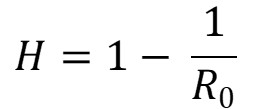Financial markets should probably take the new strain of the Sars-CoV-2 rather seriously. Its higher infectiousness increases required level of herd immunity by quite a bit. More people will have to be vaccinated before we can relax. However, the widespread resistance towards taking the vaccine could make herd immunity nearly impossible to obtain. Such an outcome would hamper the economic recovery unless paired with better therapy for infected persons.
A new coronavirus mutation
A new strain of the Sars-CoV-2 has been identified, first in the UK and South Africa, then in several other countries across the world.
It is a mutation of the “original” virus, and specialists tell us that mutations were to be expected – it was only a question of time. The only question was how the mutations would manifest themselves. The finding has left government to scramble to limit international travel.
The new strain (named SARS-CoV-2 VOC 202012/01, making it easy to remember) is more contagious. Initial studies indicate it is about 70% more infectious than the original strain. On the other hand, it does not at this time appear to be more deadly to those infected. There is also considerable optimism that the new vaccines will not be any less effective towards this new strain.
About that herd immunity
So why worry at all? We have a vaccine, right?
First, it will accelerate the number of new cases. With more new cases, more hospitalisations will follow, and so will the number of patients in need of intensive care.
Given that several countries already are at capacity, this is serious enough. But it is “just” a question of putting enough resources in. Several countries have already managed to expand the ICU capacity.
The key lies in the notion of “herd immunity”. This refers to the percentage of the population that must gain immunity before the disease will disappear by itself, however slowly. Calculating this percentage is a bit tricky, even if the formula is simple enough:

where R0 (R naught) is the number of new infections each infected person will cause and H is the percentage of immune persons required to obtain herd immunity.
Currently it is estimated that herd immunity will happen when 66-70% of the population is immunised, either through vaccination or from having developed immunity after being infected.
Choosing H to be 68% enables us to calculate the implicit R0 to be 3.125 for the currently dominant strain of Sars-CoV-2. Add 70% to that number and you arrive at a new R0 at 5.31.
Now put this number into the formula above and we arrive at H = 80.5% as the Herd Immunity number for the new strain of the virus.
In short, the new more infectious strain means that about 12% more of the population must obtain immunity before the disease dies out. 12% of the global population of 7.79bn amounts to a whopping 935m people. For this reason alone, the new strain is very likely to delay the time until the disease is brought under control and the global economy can recover entirely.
Politics and “herd mentality”
And then we unfortunately need to look at politics. The current crop of real or would-be populist strongmen comprises those who are attempting to wield the powers of the government to their own advantage (read Putin, Orbán, Erdogan) and those who have openly questioned scientists as a part of the deep state that must be ignored or destroyed (read Trump, Bolsonaro, Duterte and to some extent, Boris Johnson).
By their equivocations, the latter group have played directly into the “Anti-Vaccine” movement which has gained ground since the ‘90s. Back then, now-disgraced British physician Andrew Wakefield claimed to have discovered a connection between combination vaccines and autism.
While Wakefield’s work has been thoroughly debunked in hundreds of later studies, Anti-Vaxxers have not listened.
Instead, according to opinion polls, more than 50% of Americans to not want to be vaccinated against CoViD-19. If this is the case, and if this level of resistance is representative of a broader global attitude against receiving the vaccine, it is bad news.
If the 66-70% herd immunity is difficult to obtain through vaccination, obtaining 80+% appears virtually impossible.
It means that the virus will be with us well into 2022, and that the economic recovery will be slower.
We do believe that the financial markets will realise this at some point. The effect on the markets is uncertain. Logic says that this should be bad for stocks and good for bonds.
However, the recent past has seen reactions in the stock markets, which seems “immune” to any challenges to their belief that everything will be fine and until then, rock-bottom low interest rates will be the only “vaccination” they need.
We are just saying.




Reading Time: 3 minutes